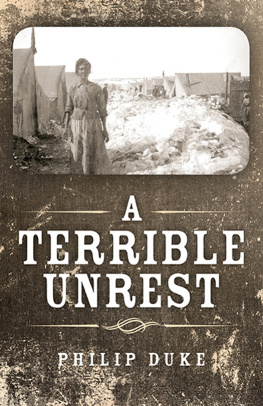ABOUT THE AUTHOR
Eleanor is Canadian, born in Guyana, South America with West African ancestry. She is keenly interested in her cultural and historical heritage, in young women's empowerment and in Black women's health. Eleanor lives in Toronto with her husband.
Chapter 1
A GIFT OF THE GODS
June 1799
Mariamas heart felt light with joy. She was excited about this birthday and had woken up full of hope for all the good things the day would bring. After breakfast, she washed the dishes, took the palm leaf broom from the shelf on the kitchen wall and swept the entire hut. Braima finished his meal quietly, and he too began his daily task. He skipped down the short track of red dirt to the cattle pen, where he let out the six billy goats and four nanny goats. Then, passing through the clearing, he led them into the pasture to graze and joined the other young boys herding their sheep and goats, or pitching marbles in shady areas of the savannah.
Her chores complete, Mariama walked through the clearing and sat under her favourite tree the baobab with the huge limbs and big, bushy leaves. She loved to sit in this place to think about important things. Today she thought about her upcoming Sande and initiation into womanhood.
It was her thirteenth birthday. Sande celebrations for her and the other four girls turning this magical age would begin soon. Like most Mende girls, Mariama had great expectations for this birthday the one that would complete her rite of passage to everything feminine and adult. She could only imagine all the secrets she would learn from the older women, such as how to be a good partner, wife, and mother, to how she might even become a female chief one day. In just a few days when the men came home from the marketplace, it would be time for the girls to leave the village to begin their secret lessons and then return for the celebrations: the drumming, the dancing, the feasting lots of feasting. Her heart beat more rapidly in response to the pictures her imagination was painting and she shivered with the thrill of knowing that changes, big changes, were coming to her life, and soon.
There had been a buzz of activity as women prepared meals of corn and cassava and men repaired thatched roofs on some of the circular mud-daubed huts. Bursts of sunlight flooded the plain, and cumulus clouds dotted the blue sky as far as Mariama could see. The vegetation was lush and green from the recent rain. A temperate breeze was keeping the day relaxed and tolerable. Nature had joined in the preparations.
Leaning against the trunk of her beloved tree, Mariama closed her eyes and smiled as she daydreamed and listened to the excited voices nearby. Suddenly her reverie was shattered by rough grasping hands on her back and waist. A scream rose in her throat but was stifled immediately as one hand moved up to cover her mouth and nose.
She tried to break from the grip while struggling to breathe. Her attacker quickly lifted her slender body, kicking and squirming, into the nearby bush. Mariamas screams were muffled, and lost in the background noise of the village. Although other villagers were within earshot of this unfolding drama, no one could hear her. She could not see her captors or shake free of their iron hold.
In the concealment of the bush, he laid her down on her stomach. Straddling her slender body, he tied her hands behind her back and held her feet together. She could see a second man close by, securing the hands and feet of a young boy. It was Hindolo, from her village. He had a band wrapped around his mouth and tied in a knot at the back of his head.
Now a similar gag was being applied to her. By turning her head slightly, Mariama was able to see the faces of both captors. She recognized the eyes, now steely and heartless, of one of the men from a village about two miles away. He had come there many times to help her father and other villagers mend the damaged thatch on their roofs. She looked at him pleadingly; he looked back with empty eyes. The other man leaned in and carefully untied her hands and then Hindolos, quickly linked Mariamas right hand to Hindolos left and pulled both children to their feet. Their journey began.
Chapter 10
DEMERARY
September 1799 February 1800
A forest of masts filled the harbour, and the wharf behind them bustled with activity. The ship warped slowly in as the crew prepared the vessel for docking. Ropes and chains were pulled in different directions and then secured to large planks that plunged into the mudflats under the landing.
The crew began to bring the surviving male slaves up on deck. Each man was hosed down with murky brown water from the river. After the wash, sailors placed a bucket with oil and pieces of rag in the centre of the deck and showed male captives how to rub the oil into their skin and on their heads and faces to enhance their appearances. Next, women captives were ordered to do the same.
Crew members led the Africans off the ship as they had been led on in shackles and irons, in the seemingly endless weeks before. Now, though, here in Demerary, there were a lot fewer of them. Eighty souls did not survive the voyage. The sailors then herded the enslaved into a large wire cagelike structure at the far-right corner of the wharf called the pen. The crew now corralled about fifty mostly naked Africans into the belly of the pen at a time. The operation reminded Mariama of the goats she and Braima had herded back in Yele.
White men were gathered at the dockside. Dressed in clothing excessive for the heavy heat, they strutted about, sweating profusely and checking timepieces hooked to chains on their waists. They circled the pen and observed the caged goods, scribbling notes and barking comments. Once each man had made his selection, his picks were prodded out of their holding area back onto the open dock for closer inspection and, usually, purchase. This sequence of events was repeated until the entire batch of new arrivals had been sold. A few Africans as well as other brown-skinned men with straight dark hair had accompanied some planters and observed the transactions. The white men called them Indians.
Stepping back on solid ground was disorienting for the recent arrivals. The earth seemed to shift as if they were still on board the Archery. A few men knelt and lowered their faces to the ground with their palms against the earth. There were shouts of Yabo godiya! and Chi otuto! and Mungu wa sifa! and Allahu Akbar! as they thanked God, in multiple languages, for sparing their lives on the long and treacherous journey.
***
Quick sale two strong young bucks. Only sixty-five quid.
Young wench twenty-five quid.
The auctioneer spoke rapidly. About two hundred and forty-five men, women, and children were sold that afternoon. Joseph Blumefield purchased six of the lot three young males, one middle-aged male, and two young females.
Line em up, Bart, line em up! he called out.
Bart, the old blacksmith, pushed and probed the newly purchased Africans into a straight line with a sharpened tree branch. Then he turned to a large rusted iron pot filled with white-hot coals, pulled out a glowing red iron prong, and methodically passed along the queue, stamping the letter B into their exposed right shoulders.
Hiss ... hiss, the sizzling sound erupted, and a sickly coppery smell permeated the torrid tropical air as the brand met human flesh.
Mariama choked on the smell. She held her nose and covered her mouth to prevent from gagging as shrill screams erupted from the recoiling captives in the lineup ahead of her. Eyes closed, she dug her heels into the damp red dirt and let out a shriek that startled but didnt deter Bart as he approached her. The searing pain that shot through her shoulder with the branding strike was crushing, and her scream mingled with the agony of the others around her.








